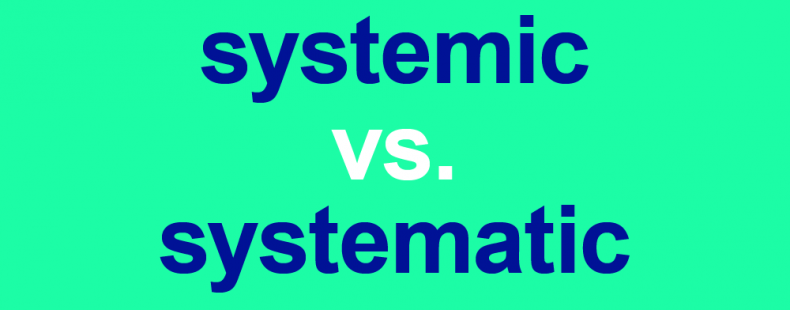The George Floyd protests brought attention to the word systemic—among many other powerful words that speak to this historic time—like never before. Many activists and public officials are calling to dismantle the systemic racism in policing and other social institutions that are disproportionately killing and oppressing Black people.
These calls, and our broader cultural conversation around them, have stoked significant interest in—and considerable confusion around—the word systemic itself. Searches for the word systemic spiked 1870% on Dictionary.com on June 10, 2020 alone.
Systemic is a difficult word, and problems, like racism, that are characterized as systemic can be difficult to grasp. Plus, systemic is extremely similar, in both sound and sense, to the word systematic.
In this article, we’ll explain the difference between systemic and systematic, how you can tell them apart, and provide tips on how to use them correctly. We’ll also explain the meaning of systemic racism and how it fits into the discussion of these two words.
What is a system?
Both systematic and systemic are adjectives based on the word system. First recorded in the early 1600s, system ultimately derives from the Greek sýstēma, “a whole compounded of several parts.”
To understand the difference between systematic and systemic, it helps to break down the word system. That’s because systematic and systemic draw on slightly different senses of the word system in English.
Let’s highlight several of the many senses of the word system in particular:
The first sense is “any formulated, regular, or special method or plan of procedure.” It helps to keep this sense of system in mind when considering the word systematic. Here is an example of this sense of system: I have a system for cleaning my house that involves starting from the front and finishing at the back.
A second sense of system we want to call attention to is: “an assemblage or combination of things or parts forming a complex or unitary whole.” For systemic, it helps to keep this sense of system in mind. Here is an example of this sense of system: To learn to write in Japanese, you have to learn a writing system that uses three different sets of characters.
What is the difference between systematic and systemic?
Systematic is an adjective that primarily means “having, showing, or involving a system, method, or plan.” A synonym for systematic is methodical. Systematic draws on the first sense we highlighted in the previous section: a system as a “method” or “plan.”
So, if you do something in a systematic way or do something systematically, you have a method to your madness. You have a plan in place. You have a strategy. You’re not doing things randomly; you’re organized and structured in some way.
How about an everyday example: how do you clean your house? Do you start by completing cleaning the kitchen and then go through each room one at a time? Or, do you start by dusting every room first, then wiping them down one by one, then vacuuming and washing the floors? Or maybe you dust and clean surfaces on Saturdays, then vacuum and mop on Sundays?
If you have some kind of organized plan that you follow, you can say you have a systematic approach to cleaning your house. You are cleaning systematically—methodically, planfully, strategically. If you don’t have a system, you are just going about randomly and haphazardly.
The first records of systematic go back to around 1670. Via Latin, systematic ultimately comes from the Greek systēmatikós, an adjective form of the root sýstēma, source of system.
Systemic is an adjective that means “of or relating to a system.” It is especially used to describe some phenomenon—an illness, a social problem—that affects every part of an entire system. Some near synonyms to systemic are structural, comprehensive, inherent, pervasive, ingrained, and extensive. Besides a plan or method, a system, as we saw in our first section, can also mean a group of parts or things that come together to form a whole; systemic draws on this sense of system.
It helps to know a little history and anatomy when it comes to the word systemic. In biology, a system can refer to the cells and organs that work together to accomplish the same goal (such as the immune system) or to the entire organism (e.g., chocolate is toxic to a dog’s system).
Some of the earliest uses of systemic referred to diseases that affected more than one organ system (such as the circulatory system or digestive system). Systemic especially refers to diseases that affect the whole body. In medicine, systemic is still widely used this way today. Many types of cancer are systemic diseases, for instance, spreading throughout and harming the entire body.
System has developed to refer to various nonliving systems that are large and complex—writing systems, belief systems, or, on the level of social institutions, systems of government, banking, and healthcare, to name a few. These systems involve various smaller parts, organizations, and levels that form an intricate whole; think about the complexity of the English alphabet, with letters representing sounds and combining together to represent words. Then, think about the complexity of the federal government.
Especially when talking about social institutions like government or healthcare, systemic is used when discussing something that affects the whole—systemic problems, systemic change.
For example, some banks are so central to the global economy that they are considered systemic banks by certain oversight or regulatory agencies. A systemic bank, such as the Bank of America or Bank of China, is so important to the overall financial system that, if it were to fail, it could cause systemic damage—its failure could set off a collapse of the global economy.
Compared to systematic, systemic is the newer word, dating back to between 1795–1805. Systemic was formed within English as a combination of the word system and –ic, an adjective suffix commonly and originally appearing in Greek and Latin loanwords (e.g., public, metallic, poetic).
What is systemic racism?
When we discuss racism, we often think of explicit acts of racism: slavery, lynching, and segregation, from a historical perspective, or individuals using slurs or groups like the Ku Klux Klan today. Explicit racism is very real, and very painful.
But less obvious, and more insidious, is systemic racism. Also called institutional racism or structural racism, systemic racism is when racism is embedded into the very institutions and organizations of society, such that laws, rules, procedures, etc. are influenced by and perpetuate racism—and typically in ways that are invisible to the white dominant culture, which in many cases (as in the US) consists of white people.
Examples of systemic racism in the US—and against which the George Floyd protests are fighting—that disproportionately harm Black people (not to mention other minority groups) include:
- Higher rates of arrest, imprisonment, and use of excessive and lethal force
- Lower rates of hiring compared to white candidates
- Lower wages than white people for the same work
- Twice the rate of infant mortality
- Less access to educational, financial, housing, and healthcare resources
Systematic racism, if you were to use the phrase, would more closely resemble explicit racism. For instance, an employer (in gross violation of law) would engage in systematic discrimination if it refused to interview any person who applied for a job if they were Indigenous, for example.
WATCH: What Are Other Words Related To "Prejudice"?
How to use systemic vs. systematic
The word systematic is more common than systemic, according to data. That may help explain why some people use systematic when they might, more accurately or technically, mean systemic, especially when referring to the concept of systemic racism.
Of course, once again, systematic and systemic are just two letters and one syllable apart, and are both based on system—not to mention the fact that a system is a fairly abstract, sophisticated concept to begin with.
To be systematic about using this confusing pair and avoid systemic errors, here are two interrelated tips.
Tip 1: “plan” or “whole”?
Which sense of system do you want to draw on: system as “step-by-step plan” or system as “the whole thing”? If you want the “plan” sense of system, use systematic. If you want the “whole” sense of system, use systemic.
Try it out by picking the right word below:
- After investigation, it was discovered that the entire school district, from superintendents to teachers, was suffering from (systematic/systemic) corruption.
- Compiling his references, making an outline, and setting draft deadlines helped the student tackle the research paper in a (systemic/systematic) way.
The first sentence calls for systemic because the corruption is affecting multiple levels of the school district. The second sentence calls for systematic because the student is writing the paper with a clear plan.
Tip 2: try using a synonym
Which words can you substitute for systematic or systemic and still keep your intended meaning intact: methodical or extensive? If you can substitute methodical, you most likely want to use systematic. If you can substitute extensive, you most likely want to use systemic.
- Example: The city developed a systematic approach to rolling out its new recycling problem, first issuing flyers and then providing bins one neighborhood at a time.
- Swap: The city developed a methodical approach to rolling out its new recycling problem, first issuing flyers and then providing bins one neighborhood at a time.
- Example: A lack of clear communication created systematic challenges for the new business, impacting everything from understanding expectations to meeting deadlines.
- Swap: A lack of clear communication created methodical challenges for the new business, impacting everything from understanding expectations to meeting deadlines
In the first example, does swapping out methodical make sense? Yes! Systematic is the best word choice. In the second example, what, exactly, would methodical challenges be? A lack of communication certainly impairs planning, but the main idea of the sentence is that communication problems affected everything the business was doing; systemic is the best word choice.
For even more synonyms for systematic, visit Thesaurus.com.
Systematically vs. systemically
Another distinction worth noting is that something done systematically is typically done explicitly and intentionally. Things that exist systemically, as in systemic problems, are often under the surface and unseen to people, far more extensive than any one action—like fish who don’t know they’re in water.
All this said, the English language itself hasn’t always enforced strict distinctions between systematic and systemic; there are plenty of examples, dating back to the 1800s, where the two words were treated as synonyms, though that’s rare today.
We say: if you’re trying to call out systemic racism and say or write systematic racism by mistake, don’t sweat it and don’t let it stop you. There are far, far more important matters at stake than pedantic, semantic quibbles.














